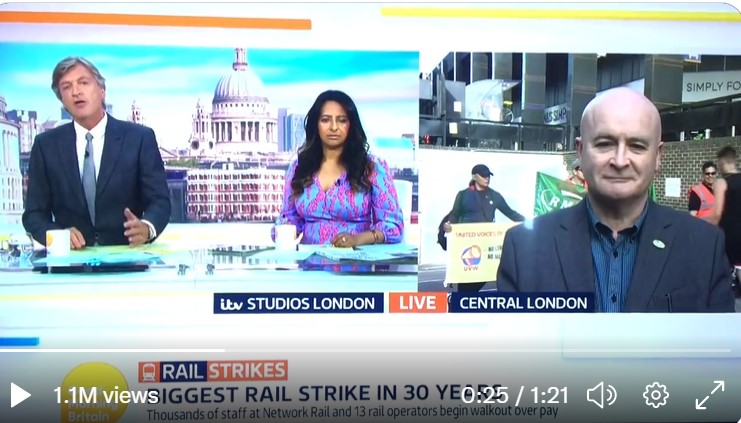
Much of Britain seems to have fallen in love with Mick Lynch, the gruff but articulate RMT leader whose 40,000 rail worker members are staging a series of three 24-hour walkouts over proposed reforms to their working conditions and jobs.
The first strike has caused huge disruption to the national rail system at a time when, amongst other things, children have school exams and many people need the transport system to get to work. Getting public opinion on side during a strike is never easy, which is why it is so important to have good media spokespeople on your team.
And it is safe to say that Mr Lynch has turned out to be a dazzling media performer. In a series of interviews he attacked absurd questions from journalists, tore into Conservative MPs and ministers (including one in which he used the term liar 16 times), all while staying focused on his message and keeping his cool.
This video of Mick Lynch eating Kay Burley alive is pure magic. pic.twitter.com/Q5iaTLwtY6— Angry Scotland Podcast (@AngryScotland) June 21, 2022
In many ways this punchy approach is a breath of fresh air. But it is also a stark reminder of just how bad political communication has become that we all get so excited about someone who calls a spade a spade and calls bullsh*t on ridiculous questions.
Yet, at some levels, Mr Lynch is just a really good, well-prepped spokesperson doing some fairly standard things.
What he does that all-good spokespeople do:
- He talks like a normal person
All good communicators talk in language that 10-year-olds can understand. In an age of bluster, lies and scripted talking points this is hugely refreshing. But he also avoids union jargon and buzzwords – there is no in-group language of ‘collective bargaining’ or ‘solidarity.’ He is talking straight to the public, not his members. - He has a great voice
It is slow, low pitched and deliberate, the hat trick for spokespeople who want to ooze authority. - He is completely self- possessed
He sits quietly, listens and when he does speak, he does not ad lib. He also knows exactly what he wants to say. How do I know this? Because he maintains eye contact, does not um and er too much and keeps his posture and body language mostly under control. He never gets angry despite being interrupted and asked some ridiculous questions. - He repeats his prepared messages
He does come back to some prepared key messages about ‘jobs, wages and conditions’ as well as ‘the Covid smokescreen’ that the employers/government want to use as a pretext to push through reforms. He’s in control of his framing and supports it with clear facts and examples. - He doesn’t ignore questions
Despite what you may think, good spokespeople do engage with the tough questions.. They don’t avoid or block them as a lot of bad politicians do. This is crucial for establishing trust and credibility.
And here’s what he does that is different:
- He picks fights with journalists and challenges their line of questioning
Most PR people would be horrified by this. It is a rule of interviews that you don’t challenge journalists about their questions because you will probably lose. I think it’s fair to say that Mr Lynch does not but this is a high risk tactic that most people can’t pull off. What he does is challenge the premise of the question and its absurdity without falling into any of the culture war/1970s strike cliche traps. This may not last now that the media know it’s his thing. - He picks up on the language of provocative questions
The first question in one interview with GMB Host Richard Madeley was ‘Are you a Marxist?’. After a bit of tussling over the question being ‘twaddle’ Mr Lynch said ‘I am not a Marxist’. PRs and media trainers usually pull their hair out over repetition of a negative because there is a risk that it can hijack the interview and end up as the quote. Frankly, I am amazed that there is no headline in the Daily Mail that says ‘I am not a Marxist’. - He doesn’t love the sound of his own voice.
His answers are generally concise and he doesn’t interrupt or talk for the sake of it.
In Mr Lynch’s case, it would seem that saying less is definitely more.
